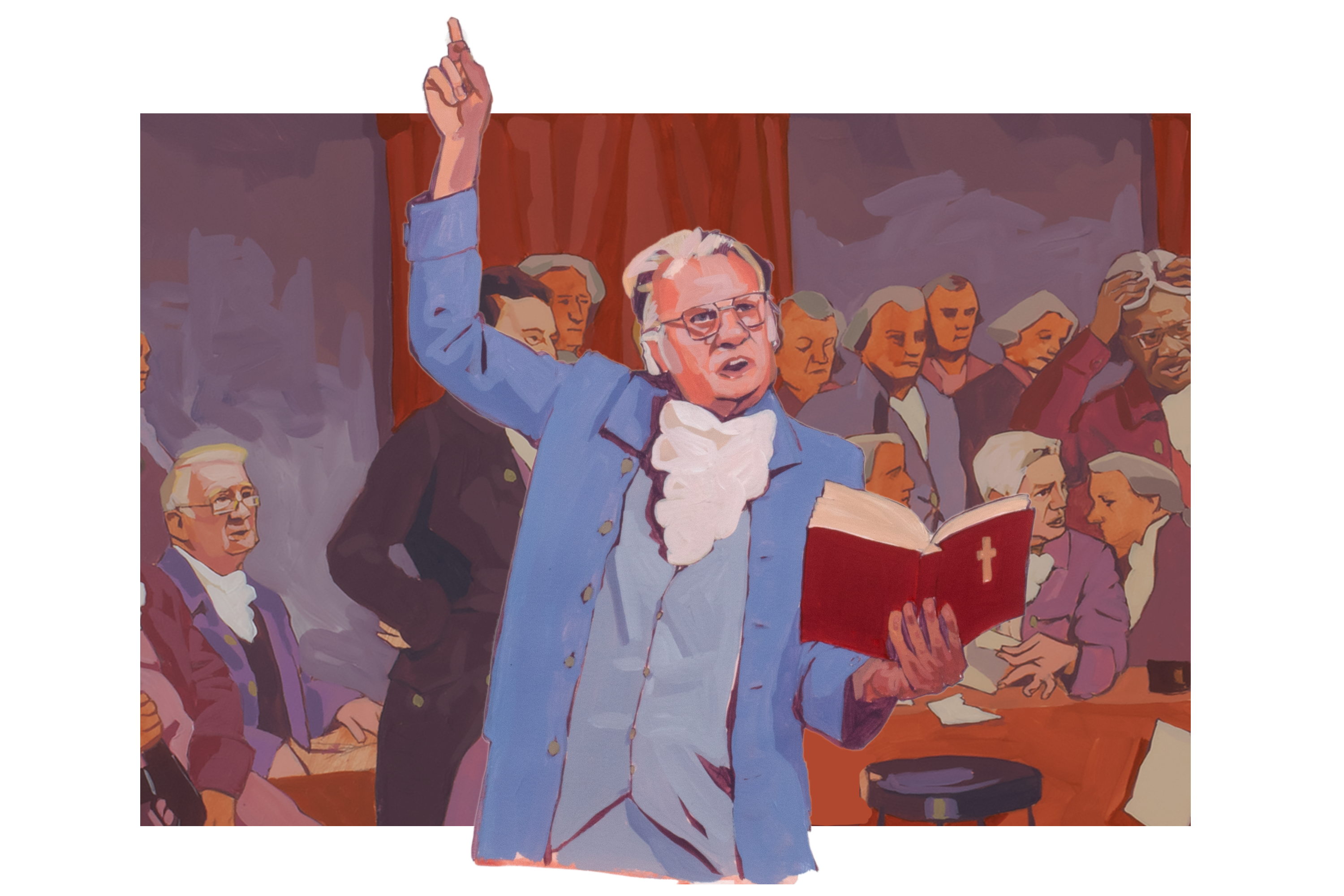This is part of How Originalism Ate the Law, a Slate series about the legal theory that ruined everything.
One of the inescapable conclusions that came from diving deep into the allure of originalism was the profound and uniquely American connection between theories of constitutional interpretation and methodologies of religious exegesis. Professor Jamal Greene writes that “[t]he American attitude toward the Constitution is frequently described in terms of worship, reverence, and fidelity.” Greene cites Max Lerner fretting all the way back in 1937 that “the very habits of mind begotten by an authoritarian Bible and a religion of submission to a higher power have been carried over to an authoritarian Constitution and a philosophy of submission to a ‘higher law.’ ” Lerner then pointed to the paradox wherein “a country like America, in which its early tradition had prohibited a state church, ends by getting a state church after all, although in a secular form.”
It’s impossible to separate the new, conservative affinity for treating text as sacred and the Supreme Court as oracular diviners of holy meaning from statistics showing a statistically significant correlation between Americans’ approval of originalism and their belief in the literal truth of the Bible. One of my favorite thinkers on the link between originalism and religion is Yale Law School professor Jack Balkin, Knight Professor of Constitutional Law and the First Amendment and director of the Information Society Project at Yale, whose new book, Memory and Authority: The Uses of History in Constitutional Interpretation, was published earlier this year. I spoke with him about the connection on the latest episode of Amicus, which we’ve excerpted below. The excerpt is condensed and edited for clarity.
Dahlia Lithwick: I would love for you to talk about religion, because there’s such a strong religious valence to so much of this much. You write this in your new book, Memory and Authority: “A distinctive feature of American constitutional culture is its quasi-religious veneration of its framers and founders.” I would love for you to tell me how this maps on to this very strange, fraught American religion of the Constitution?
Jack Balkin: Compare America to Canada: The Canadians have a constitution that protects rights and liberties and allows its government to do stuff. They don’t have the same kind of worshipful attitude toward the people who, over many years, created Canada. The French: They do have a revolutionary culture, the French Revolution—but the French don’t revere the revolutionaries as we do. (That’s because some of the revolutionaries are people like Danton and Robespierre, who are very complicated individuals.) What’s interesting about America is it’s a political revolution in a revolutionary culture, and it’s a revolution in which the country, the imagined people, the American people, and the nation all are supposed to have occurred at roughly the same time. And the people who make the Constitution are the people who make the nation and who constitute the people as a people.
This is a myth, by the way. This is not true—that it all happened at the same time. But in the myth, the people who did it are our heroes because they made our nation and our Constitution and we love them, right? So that’s very American, and you won’t find that combination, that magical combination, in a lot of other countries. It is, however, one reason why we venerate the founders. But we have a bunch of other cultural heroes too: Lincoln is a cultural hero, Martin Luther King Jr. is a cultural hero, and we have various others: Rosa Parks is a cultural hero. So we have all these culture heroes in America who stand for great things and who did wonderful things. But what’s so interesting is that the original cultural heroes are the founders, as a group. And then there are individual ones—the big six, you know: Washington, Hamilton, Madison, Jefferson, Adams, and Franklin. These are the big six. And they stand out as special kinds of heroes. So that’s America, that’s just American culture.
Now, religion. So as you know, the American culture begins with radical Protestants coming to America. And then they all split up into different religious sects. But what they all have in common is a belief that you should really be serious about religious texts and the Bible. And you should read them carefully, and you should interpret them on your own, and you shouldn’t be beholden to any special group of priests to tell you what it means. You should determine what Scripture means for yourself. This is also very American. It’s how Americans think about their Constitution and their declaration. People carry copies of the Constitution or the Declaration [of Independence] in their pockets. They pull them out and read them. You will not find people in other countries pulling out copies of their constitution and reading them like it’s Scripture. And that’s the religious tradition in America. And, by the way, it’s on the left and the right, it’s not just about conservatives, it’s liberals and conservatives.
It’s how Americans think about the texts that are constitutive of them. And the declaration is treated often as equally important, if not more important than the Constitution. As Lincoln says, It’s the golden apple, and the silver frame is the Constitution that surrounds it. And that’s also very American. And this goes all the way through American history. It’s not just the modern period, and that’s a distinctive feature of our culture. Indeed, I would just say: You can’t understand American constitutionalism without understanding American culture. The two are basically joined.
